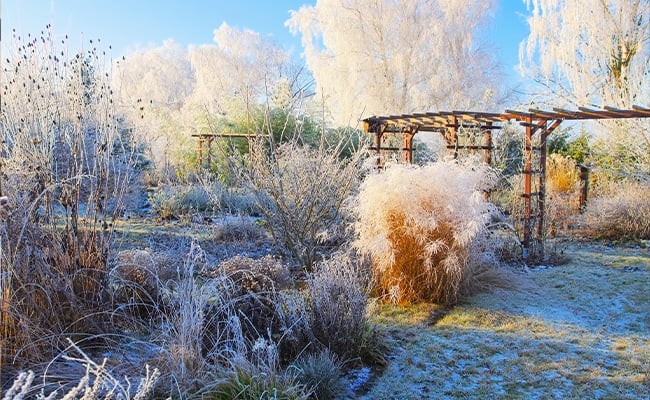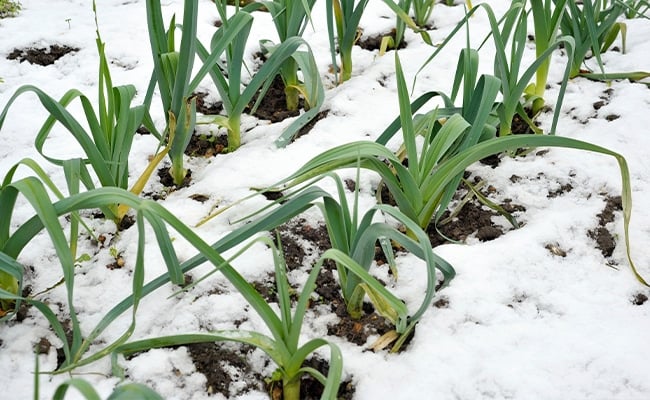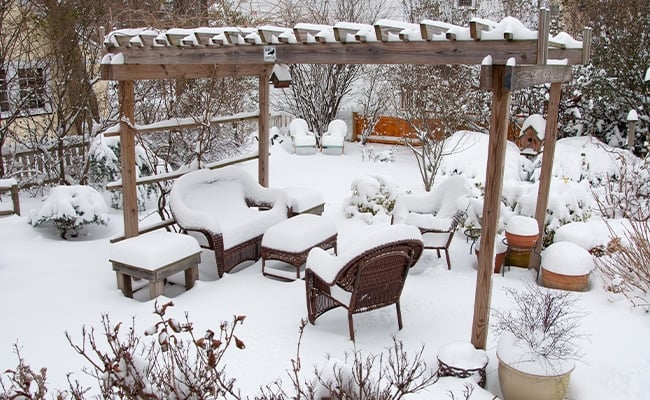What Are The Benefits Of Snow In The Garden?

A lot of snow might seem problematic for the growing season, but in fact many gardeners see it as a good sign for crop yields. There is a great deal of folklore around the benefits of snow for crops, but does it hold true? Learn about the benefits of snow beyond the natural beauty it provides!
Snow: A Natural Fertilizer?
Snow is much more than frozen water falling from the sky! Its delicate crystalline structure contains tiny pockets that collect other molecules as it floats to the ground, carrying nutritious elements from the air to the soil. Snow may revitalize soil by restoring trace amounts of nitrogen and sulfur. This is why some gardeners say, “snow is a poor man’s fertilizer.”
Snow Means Water Is In The Air
Water is vital to plant growth. When temperatures are extremely cold there is less water vapor in the air, and as a result there is less snowfall. (For example, the two driest deserts on Earth are the Antarctic Desert and the Arctic Desert, where temperatures are consistently and bitterly cold.) However at warmer temperatures—closer to the freezing point of water—air holds more water vapor, which permits snow to form. Heavy, wet flakes have a higher moisture content. Thus classic sayings like “year of snow, crops will grow” and “good winter snow makes all the plants grow” make sense.
Snow As An Insulator
In general, an ideal winter for crop yield has deeper snow cover due to slightly warmer temperatures (though still cold!). Deep snow cover insulates the ground. While the upper layers of soil will still freeze, the ground will thaw sooner and permit earlier spring planting for a longer growing season. This may boost crop production for farms and gardens of any size. For many generations, farmers and gardeners have articulated this process with the expression, “if the first snowfall lands on unfrozen ground, the winter will be mild.”
Related: Farmers’ Almanac Winter Weather Forecast
Another saying relates to later season snow: “If February brings drifts of snow, there will be good summer crops to hoe.” This reinforces the idea of greater snowfall bringing spring moisture which leads to plentiful crops. It also ties into Native American lore which says that February’s full Moon occurs when the most snow is on the ground.
Related: February’s “Snow Moon” And Alternative Names

Benefits of Snow for Your Garden
No matter which snowy sayings you prefer, there is no denying the benefits that snow adds to your garden! Not only does snow serve as a mild, slow-release fertilizer as it melts and brings nitrogen and other essential nutrients into the soil, but the moisture snow provides can help nourish seeds, sprouts, and seedlings so they survive sometimes unpredictable spring rainfall.
Snow also acts as a natural insulator with its crystalline structure and trapped air pockets protecting delicate roots and bulbs against radical temperature fluctuations during hard freezes, instead keeping the soil at a steadier (albeit still cold) temperature and minimizing frost heave damage. This is also vital protection for overwintering crops such as winter wheat, and will promote continued root growth in early winter before the soil has frozen but when the tops of plants are already dormant.
Similarly, the insulating properties of snow protect the overall soil biome, keeping beneficial bacteria, overwintering insects, and helpful earthworms safe from drastic temperature fluctuations. While the microscopic life remains protected in the soil, compost will continue to break down and the overall soil health and structure will be improved for better plant growth.
A covering of snow will also minimize erosion from winter winds, keeping delicate topsoil in place for next spring’s planting. This is especially true in open areas prone to stronger winds where trees may not be available for a suitable windbreak.
It isn’t just plants and crops that benefit from snow. Livestock can get a great deal of their necessary water when turned out to graze in winter pasture, as they will naturally consume snow along with their feed. While fresh, liquid water should always be available, snow can be a great supplement to that winter water supply.
Finally, winter snow is helpful long after winter ends. A winter with good, heavy snowfall means local and regional reservoirs are adequately refilled, which ensures plentiful water for summer when Mother Nature may not be providing all that water-intensive crops need. Furthermore, higher water levels from snow melt accumulating in major waterways will permit crops (and in some cases, livestock) to be transported for sale by more cost-effective means via large barges. If snowfall were lacking, barges would not be able to access smaller waterways and transport would become more challenging and expensive, raising prices for farmers as well as consumers.

Making the Most of Snow
If you want to make the most of every flake that falls on your garden, landscape, or farm, there are several options. For larger properties, plowing fallen snow into stubble fields can help bring the maximum amount of nitrogen and moisture into the soil, if the ground is not yet frozen or if it has already thawed only to be covered by a late spring snowfall.
Shoveling snow from hard surfaces such as walkways, patios, decks, or driveways onto the grass, flowerbeds, or garden plots will ensure the moisture sinks into the soil rather than evaporating from non-permeable surfaces. Piling some extra snow on flowerbeds, cutback plants, or around new saplings (keeping slightly away from the trunk) can provide extra seasonal insulation for those delicate areas.
Snow can be collected in rain barrels, open troughs, or other containers and, when melted, used for watering gardens or containers.
Whichever snow saying you like best or however you make the most of snow, this “white gold” can be a great sight for every gardener and farmer, beyond its natural beauty and the peaceful winter scenes it paints.
Join The Discussion
Did we answer your question “is snow good for your garden?”
Do you love snow even more after reading this article?
Have you enjoyed the benefits of snow in your garden?
Share your experience with your community here in the comments below!
Related
Farmers’ Almanac Winter Weather Forecast
February’s “Snow Moon” And Alternative Names

Melissa Mayntz
Melissa Mayntz is a writer who specializes in birds and birding, though her work spans a wide range—from folklore to healthy living. Her first book, Migration: Exploring the Remarkable Journeys of Birds was published in 2020. Mayntz also writes for National Wildlife Magazine and The Spruce. Find her at MelissaMayntz.com.






Cool! My mom, 91 years old from Japan, said her parents liked it when it snowed. They always said crops would be better. She even sang a song to me which she and her siblings would sing when it snowed. I didn’t really believe her until I read your article. Really cool, and I get to tell her she is right!